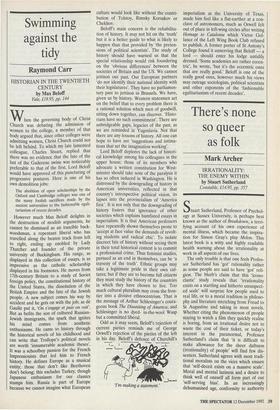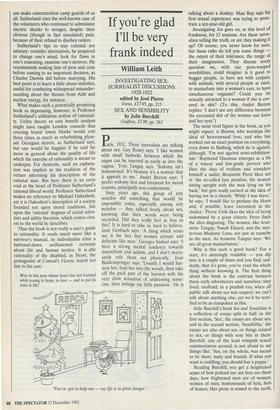There's none so queer as folk
Mark Archer
IRRATIONALITY: THE ENEMY WITHIN by Stuart Sutherland Constable, £14.95, pp. 357 Stuart Sutherland, Professor of Psychol- ogy at Sussex University, is perhaps best known as the author of Breakdown, a terri- fying account of his own experience of mental illness, which became the inspira- tion for Simon Gray's play Melon. This latest book is a witty and highly readable health warning about the irrationality at work in all aspects of our lives.
The only trouble is that one feels Profes- sor Sutherland has 'got' rationality rather as some people are said to have `got' reli- gion. The blurb's claim that this 'icono- clastic' study reveals that 'irrationality exists on a startling and hitherto unsuspect- ed scale' will surprise few people used to real life, or to a moral tradition in philoso- phy and literature stretching from Freud to St Augustine and taking in most novels. Whether citing the phenomenon of people staying to watch a film they quickly realise is boring, from an irrational desire not to waste the cost of their ticket, or today's interest in the paranormal, Professor Sutherland's claim that 'it is difficult to make allowance for the sheer daftness (irrationality) of people' will find few dis- senters. Sutherland agrees with most tradi- tional moralists on the vices which ensure that 'self-deceit exists on a massive scale'. Moral and mental laziness and a desire to think well of oneself all form part of our `self-serving bias'. In an increasingly dehumanised age, conformity to authority can make concentration camp guards of us all. Sutherland cites the well-known case of the volunteers who continued to administer electric shocks to stooges, despite their obvious (though in fact simulated) pain, because of their refusal to disobey orders.
Sutherland's tips to stay rational are salutary: consider alternatives, be prepared to change one's mind, look for flaws in one's reasoning, examine one's motives. He recommends making lists of pros and cons before coming to an important decision, as Charles Darwin did before marrying. His best point is to learn a little about statistics, useful for combating widespread misunder- standing about the threats from Aids and nuclear energy, for instance.
What makes such a potentially promising book so depressing, however, is Professor Sutherland's utilitarian notion of rationali- ty. Utility theory or cost benefit analysis might have taught London councils that erecting brutal tower blocks would cost three times as much as refurbishing pleas- ant Georgian streets, as Sutherland says, but one would be happier if he said far more in general about the quality of life which the exercise of rationality is meant to underpin. For Aristotle, such an explana- tion was implicit in the tradition of the virtues informing his description of the rational man. But here there is an eerie void at the heart of Professor Sutherland's rational-liberal world. Professor Sutherland makes no reference to Michael Oakeshott, yet it is Oakeshott's description of a society founded not upon moral traditions, but upon the 'rational' dogmas of social scien- tists and utility theorists, which comes clos- est to the world he describes.
Thus the book is not really a user's guide to rationality. It reads much more like a survivor's manual, its individualist ethic a battened-down, unillusioned certainty about life and human motive. It is .the rationality of the disabled, as Heyst, the protagonist of Conrad's Victory, learnt too late to his cost: Woe to the man whose heart has not learned while young to hope, to love — and to put its trust in life!



































































 Previous page
Previous page